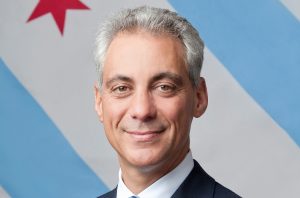Chicago budget invests in youth, police
By Kevin Beese Staff reporter — October 24, 2017Chicago Mayor Rahm Emanuel has proposed a 2018 budget that adds police officers to city streets, expands after-school programming, and provides money for small business to grow, expand and retool.
The budget proposal does not include any citywide general tax increases. It does, however, include an increase in the 911 charge for telephone lines.
“With this budget, we can build on Chicago’s long, legendary legacy of growth,” Emanuel said. “With this budget, we can increase investment in public safety, public education and quality neighborhoods because we have been disciplined in our public finances. With this budget, we can work toward a brighter future for all residents who live here, all the immigrants from around the world who still see a beacon of hope here, and all the children and young people who are growing up here and will inherit this great city that we love.”
Emanuel noted in a 47-minute budget address last week that his spending plan invests in public safety improvements by infusing the Chicago Police Department with more manpower, technology and training. The budget supports the second contingent of new officers, which will complete the mayor’s plan to grown CPD by nearly 1,000 officers. The budget also calls for more technology going into six police districts, creating “nerve centers.” In the current fiscal year, the districts that house the additional technology saw a combined 23 percent decrease in shootings, outpacing a citywide reduction.
The districts receiving the nerve centers, if the budget is approved as presented, are Wentworth, Grand Crossing, South Chicago, Calumet, Chicago Lawn and Grand Central.
Also, by the end of fiscal year 2018, every officer will be equipped with a body camera and a Taser.
“New technology’s important, but no technology, no body camera, no algorithm is stronger than the trust between officers and residents,” the mayor said. “Under Superintendent (Eddie) Johnson’s leadership, the Chicago Police Department is on the path of earning the trust of every community in Chicago.”
The budget also includes $27 million for new staffing, training and resources to implement police reforms — a $24 million increase over fiscal year 2017.
Additionally, the city’s aging 911 and 311 systems will be modernized. The revamped 311 system will allow residents to text, email or tweet service requests, such as tree trimming, pothole repairs and graffiti removal.
“We will modernize 911 and 311. Our residents depend on them,” Emanuel said. “Those systems were built for the days of land lines. They have not been modernized in decades so we will modernize them in the mobile phone era.”
The mayor also pointed with pride to his budget expanding the city’s investment in youth for a seventh consecutive year. He noted next year’s proposed budget expands after-school programming by more than 15 percent, serving an additional 15,000 students.
Other youth initiatives in the budget include:
- Adding Safe Passage routes to 10 schools.
- Expansion of youth mentoring programs.
- Creating five new early childhood centers, complementing programming in Chicago’s libraries.
“With this budget, we will continue to expand Safe Passage routes to additional schools, helping to protect nearly 80,000 children, a record high for the city, so our students going to and from school can focus on their studies, not their safety,” Emanuel said. “With this budget, we will expand our investments in mentoring programs like Becoming a Man and Working on Womanhood so more young men and women in Chicago can look back on the decisions they made in high school with pride rather than regret.”
The mayor’s budget also provides more than $23 million in funding for the Neighborhood Opportunity Fund, which aims to help small businesses that support neighborhood economies through hiring, retooling and expanding.
“Kids cannot be what they cannot see. Think of the difference for a young man or young girl going to school if there is a business in the neighborhood — a coffee shop, a restaurant, a flower shop and the sign says ‘We are hiring,’” Emanuel said “What that means beyond just a job is the vibrancy of a retail economy.
“What that means is what that child should be is right in front of him versus that child walking by that building which is boarded up. What do they see there? Where do they imagine themselves? That is the choice in front of us. That is why, in this budget, we are going to continue to make key investments in our neighborhood economies.”
— Chicago budget invests in youth, police —-




